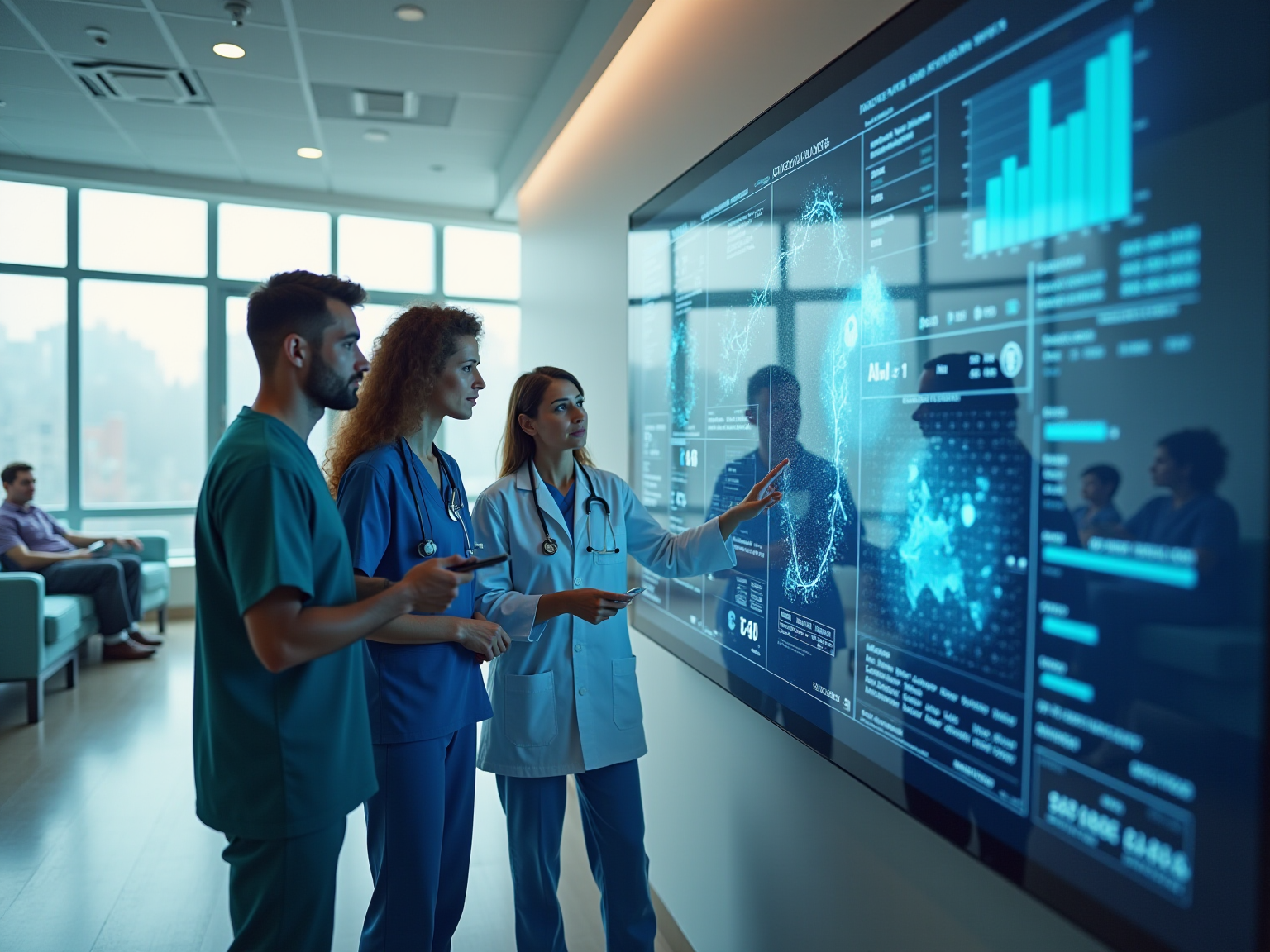Overview
We focus on understanding intelligent automation in healthcare, a transformative force that is revolutionizing the industry. With key components like AI and robotic process automation, these technologies significantly enhance efficiency and patient outcomes.
What’s holding your team back from embracing this change? Our insights are backed by compelling statistics on adoption rates and specific case studies, such as increased appointment capacities, illustrating the tangible benefits of intelligent automation.
As a result, we project substantial growth in this field, underscoring the imperative for healthcare providers to adapt. Together, let’s explore how we can leverage these advancements to improve healthcare delivery and outcomes.
Introduction
The healthcare landscape is experiencing a transformative shift as intelligent automation technologies—such as artificial intelligence, robotic process automation, and machine learning—redefine how we deliver medical services. This evolution not only streamlines our administrative processes but also enhances patient care through improved efficiency and accuracy. However, as we navigate the complexities of integrating these advanced systems, a pressing question arises: what barriers are holding our teams back from fully embracing the potential of intelligent automation?
Define Intelligent Automation in Healthcare
The integration of intelligent automation healthcare, including advanced technologies such as artificial intelligence (AI), robotic process automation (RPA), and machine learning, represents a pivotal evolution to enhance medical processes. This innovative approach to intelligent automation healthcare not only automates repetitive tasks but also incorporates cognitive capabilities, allowing systems to learn from data and make informed decisions. By minimizing manual involvement, intelligent automation healthcare systems significantly enhance efficiency, precision, and outcomes for individuals across various medical environments.
Consider the surge in telehealth usage, where telemedicine visits have skyrocketed by approximately 80% globally. This statistic underscores our growing reliance on automated solutions. Furthermore, a remarkable 86% of medical organizations are now adopting intelligent automation healthcare tools, especially in critical areas like medical imaging and revenue cycle management. For instance, Portsmouth Hospitals experienced a 33% increase in maternity appointment capacity through smart systems, which not only reduced substantial expenses but also enhanced the client experience.
The advantages of smart technology are profound. We anticipate that intelligent automation healthcare will streamline administrative duties, enhance user engagement, and ultimately revolutionize the provision of medical services by 2025 and beyond. Our Secure Hybrid Integration Platform plays an essential role in this transformation, ensuring 24/7 uptime and reliability for complex networks within the medical field. By maximizing the value of legacy technologies, simplifying integrations, and facilitating the adoption of innovative advancements like AI and VR, we are committed to enhancing care for individuals. What’s holding your team back from embracing this transformation?
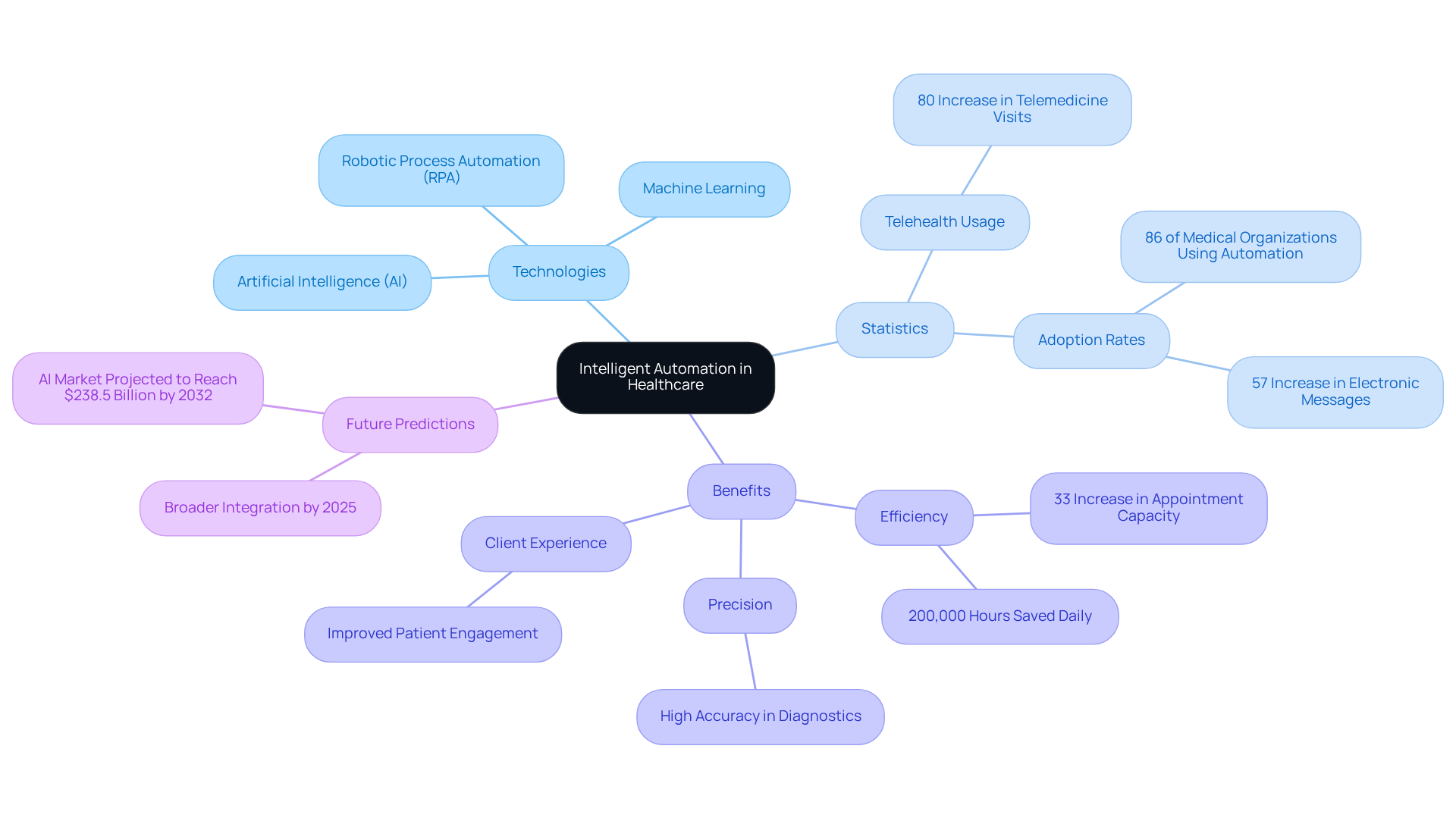
Contextualize the Emergence of Intelligent Automation in Healthcare
The rise of smart technology in medical services is not just a trend; it is a response to the growing complexity of medical systems and the urgent need for enhanced efficiency. As we face escalating administrative burdens and the demand for improved patient care, intelligent automation healthcare technologies such as artificial intelligence (AI) and robotic process automation (RPA) have gained remarkable traction.
During the COVID-19 pandemic, our investments in these technologies surged, underscoring the necessity for rapid and efficient responses to unprecedented medical challenges. Today, an impressive 94% of medical organizations recognize AI as essential to their operations, marking a significant shift in operational strategies.
The global AI in medical services market, valued at USD 29.01 billion in 2024, is projected to soar to USD 504.17 billion by 2032, illustrating the profound transformation underway. We acknowledge that intelligent automation healthcare is a cornerstone in revolutionizing medical service delivery, enabling us to adapt to evolving individual needs and regulatory standards while optimizing processes and enhancing overall care quality.
For instance, AI technologies can reduce hospital admissions by over 50%, showcasing their effectiveness in addressing medical challenges. This evolution signifies a critical shift in how we deliver medical services, as intelligent automation healthcare technology is poised to save the sector billions annually by streamlining processes and improving outcomes for individuals.
As Ross Chornyy, Business Director in the Medical Sector, aptly noted, ‘Intelligent automation healthcare plays a crucial role in the field by automating administrative tasks, improving accuracy in making a diagnosis and treatment, and enabling predictive analytics for better patient outcomes.’
Furthermore, Avato’s dedicated hybrid integration platform exemplifies how we can access data and networks within weeks instead of months, facilitating the integration of technological solutions in medical environments and enhancing overall business value.
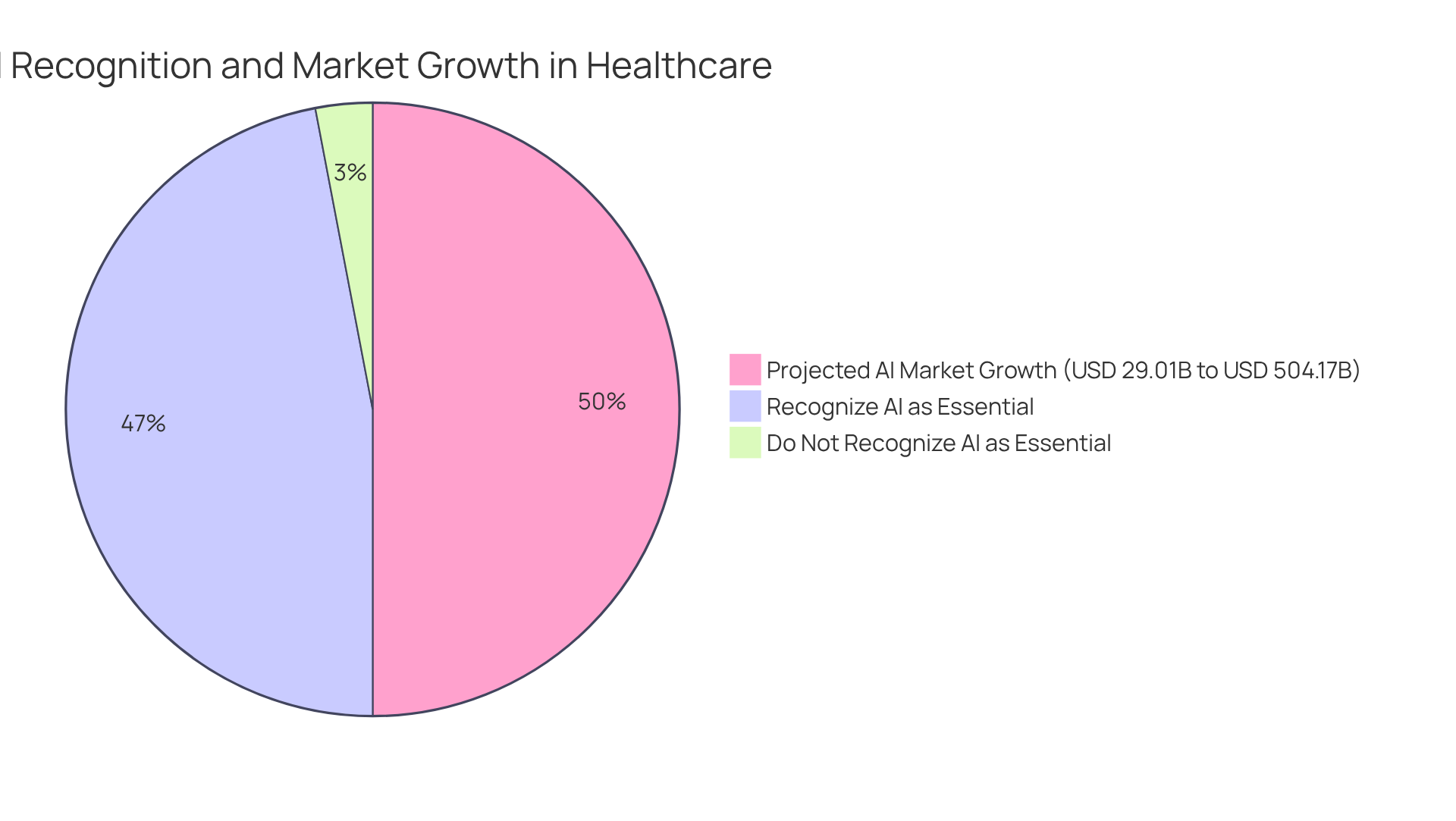
Identify Key Components and Technologies of Intelligent Automation
Key components of intelligent automation healthcare are pivotal in transforming our practices and enhancing patient outcomes. Artificial Intelligence (AI) stands at the forefront, analyzing vast datasets, recognizing patterns, and making predictions that significantly enhance our decision-making processes. In fact, 42% of employees report improvements in care quality due to AI integration.
Robotic Process Automation (RPA) is another crucial element, automating repetitive, rule-based tasks such as data entry and appointment scheduling. This technology liberates our medical professionals, enabling them to focus more on the care of individuals. For instance, Portsmouth Hospitals increased maternity appointment capacity by 33% through intelligent automation healthcare, saving £105,000 by avoiding outsourcing.
Furthermore, Natural Language Processing (NLP) allows us to comprehend and analyze human language, enhancing communication between individuals and healthcare providers. This technology is essential for improving patient interactions and streamlining administrative processes.
In addition, Machine Learning (ML) empowers us to learn from data over time, enhancing accuracy and efficiency in tasks such as diagnostics and treatment suggestions. AI applications in medicine are projected to save significant time in clinical records management, with estimates suggesting that generative AI could save 200,000 hours per day.
Lastly, Integration Platforms enable smooth data transfer between different medical networks, ensuring that information is accessible and actionable throughout our organization. Avato’s hybrid integration platform exemplifies this by simplifying the integration of isolated legacy systems and fragmented data, allowing us to innovate without compromising security or efficiency.
What’s holding your team back from embracing these transformative technologies? We invite you to explore how intelligent automation healthcare can revolutionize your delivery of services.
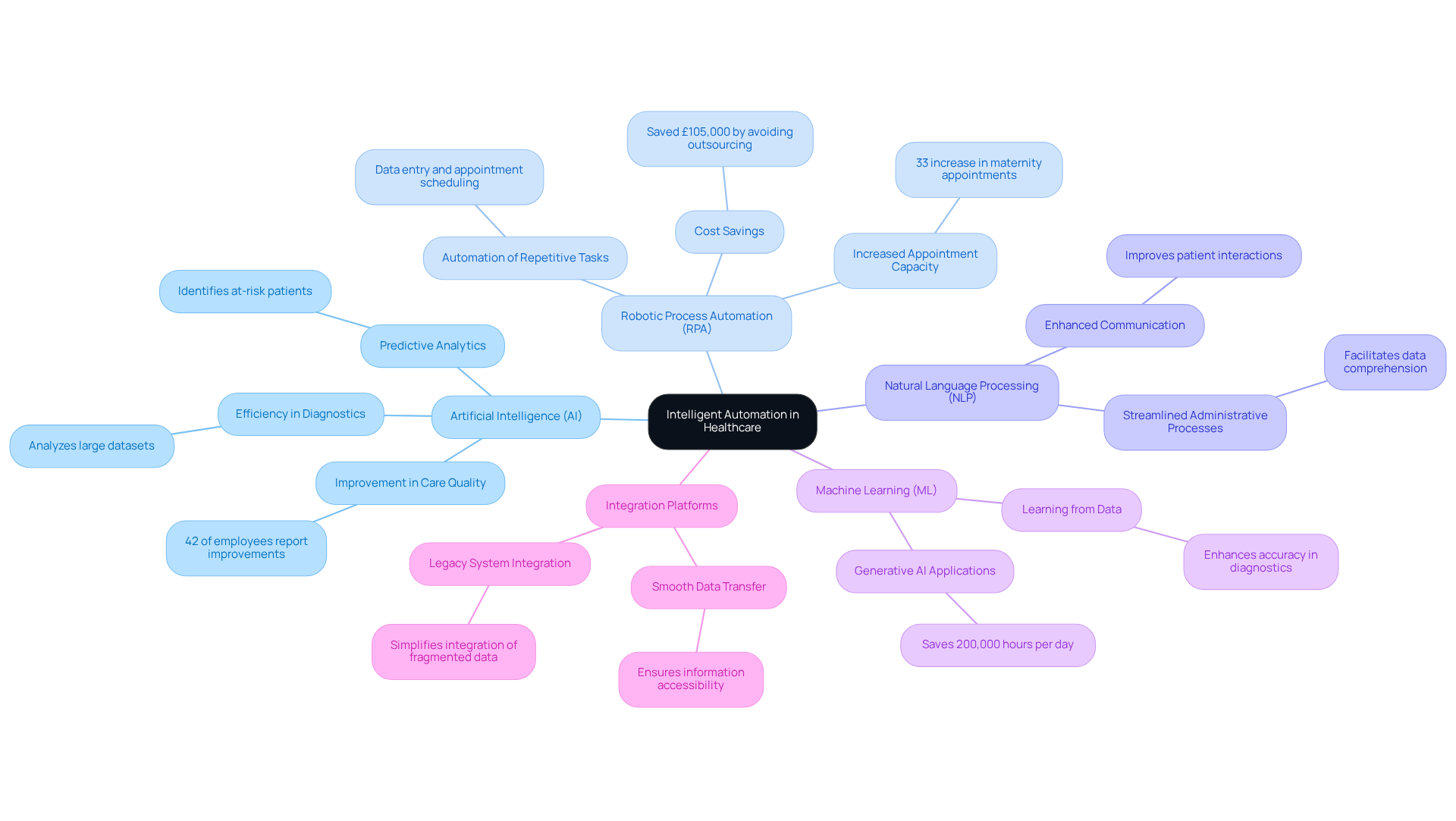
Examine the Impact of Intelligent Automation on Healthcare Workflows and Patient Care
Intelligent automation healthcare is revolutionizing medical workflows and significantly enhancing care for individuals. By streamlining administrative tasks such as appointment scheduling and billing, we can drastically reduce wait times and improve operational efficiency.
For instance, automated systems minimize errors, leading to increased satisfaction rates among individuals. Furthermore, intelligent automation healthcare allows for real-time data analysis, empowering our medical professionals to make faster, more informed decisions regarding care. This capability enhances diagnostic accuracy and supports the development of personalized treatment plans, ultimately resulting in better patient outcomes.
As we increasingly adopt intelligent automation healthcare technologies, the potential for improved care delivery and operational excellence becomes more evident. In fact, 40% of healthcare providers have reported enhanced efficiency due to intelligent automation healthcare solutions, highlighting the critical role of automation in modern healthcare.
What’s holding your team back from embracing this transformation?
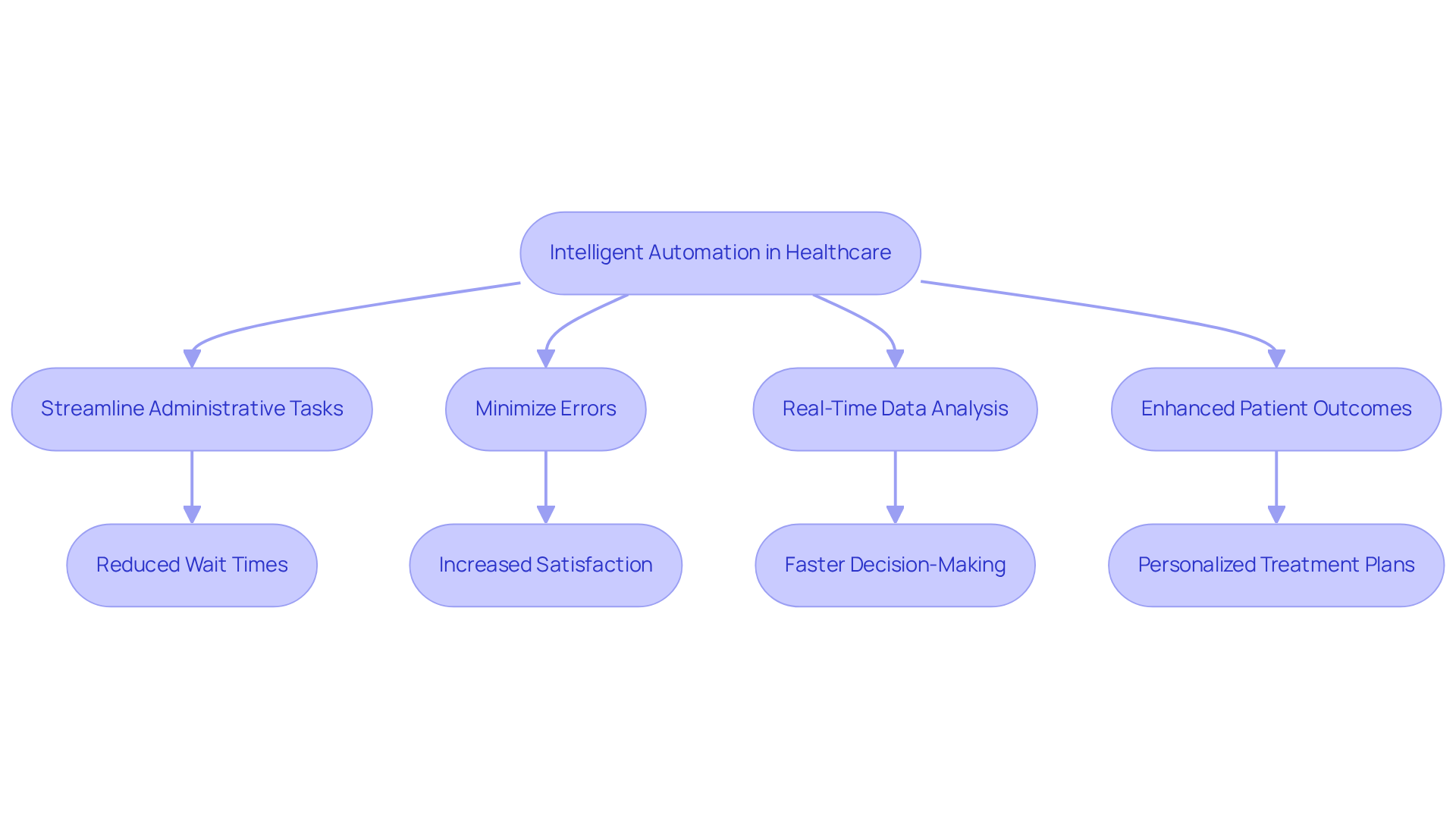
Conclusion
The integration of intelligent automation in healthcare represents a pivotal shift toward more efficient, precise, and responsive medical services. By leveraging advanced technologies such as artificial intelligence, robotic process automation, and machine learning, we are not only automating routine tasks but also enhancing decision-making processes and improving patient care outcomes. This transformation is not merely a trend; it is a necessary evolution responding to the increasing complexity of healthcare demands and the urgency for improved operational efficiency.
Throughout this discussion, we have highlighted key components of intelligent automation, including:
- AI’s capability to analyze vast datasets
- RPA’s efficiency in managing administrative tasks
- The role of machine learning in refining diagnostics and treatment suggestions
The statistics presented, such as the reduction in hospital admissions and the significant cost savings achieved by institutions like Portsmouth Hospitals, underscore the tangible benefits that intelligent automation brings to healthcare. Furthermore, the anticipated growth of the AI market in medical services illustrates the momentum behind this technological revolution.
As the healthcare landscape continues to evolve, embracing intelligent automation is crucial for organizations aiming to enhance their service delivery and patient outcomes. What’s holding your team back? We must explore and adopt these transformative technologies to not only keep pace with industry advancements but also to provide better care for individuals. The future of healthcare hinges on our effective integration of intelligent automation, paving the way for a more efficient, responsive, and patient-centered approach to medical services.

